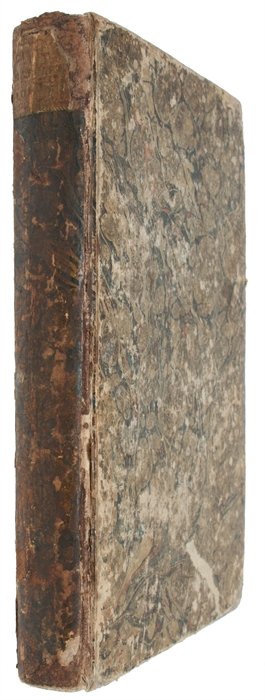THE PHILOSOPHY OF NATURE
SCHELLING, F.W.G.
Erster Entwurf eines Systems der Naturphilosophie. Zum Behuf seiner Vorlesungen + Einleitung zu seinem Entwurf eines Systems der Naturphilosophie. Oder: Ueber den Begriff der speculativen Physik und die innere Organisation eines Systems dieser Wissenschaft.
Jena und Leipzig, Christian Ernst Gabler, 1799. 8vo. Bound in one cont. marbled cardboardbdg. Spine soiled and worn at hinges and capitals, w. a bit of loss. Cont annotations to fly leaf. Old discrete owner's name to title-page, dated 1809. Four leaves w. cont. marginal annotations and underlinings. Internally well-preserved. (2), 83, (1, errata), (2, -blank) + (4), 321, (1, -Verbesserungen) pp.
Scarce first editions of these two fundamental works of Shelling's philosophy of nature.
In his early works (1795-1800), Schelling sets out to give a new account of nature, and his "Erster Entwurf..." together with the "Einleitung..." for it are placed at the centre of this attempt. At the basis of his philosophy of nature is the status that Kant had given nature, but Schelling tries to avoid some of the consequences that come with Kant's notion. He is also largely inspired by Fichte's transcendental philosophy, and in the last five years of the 19th century, Schelling is thus occupied with the relationship of the subject to the object world, -a theme that comes to found the basis for his so famous philosophy of nature. At first Fichte and Schelling stood on good terms, but as their different conceptions of nature became evident, the divergences between them became too great. As Fichte regarded nature as Not-Self, this could not be a valid subject of philosophy, and he refused to understand Schelling's philosophy of nature as complementary to his own transcendental philosophy.
Schelling's philosophy of nature presents us with a modern hermeneutic view of nature, allowing nature to be of significance beyond what can be scientifically established about it.
Along with J.G. Fichte and Hegel, Schelling ranks as the most influential thinker of German Idealism. He stands in the centre of this most important and influential of philosophical traditions, and with his philosophy of nature, his anti-Cartesian view of subjectivity and his later critique of Hegelian Idealism, Schelling continues to be of the utmost importance to the development of continental philosophy to this day.
Order-nr.: 36118

